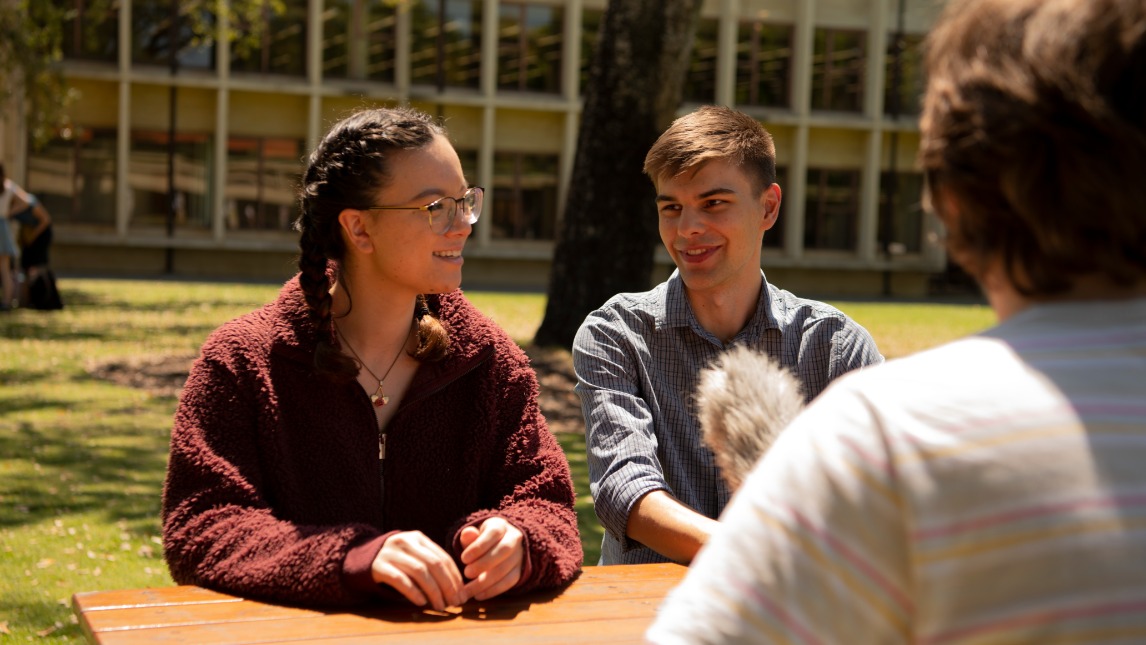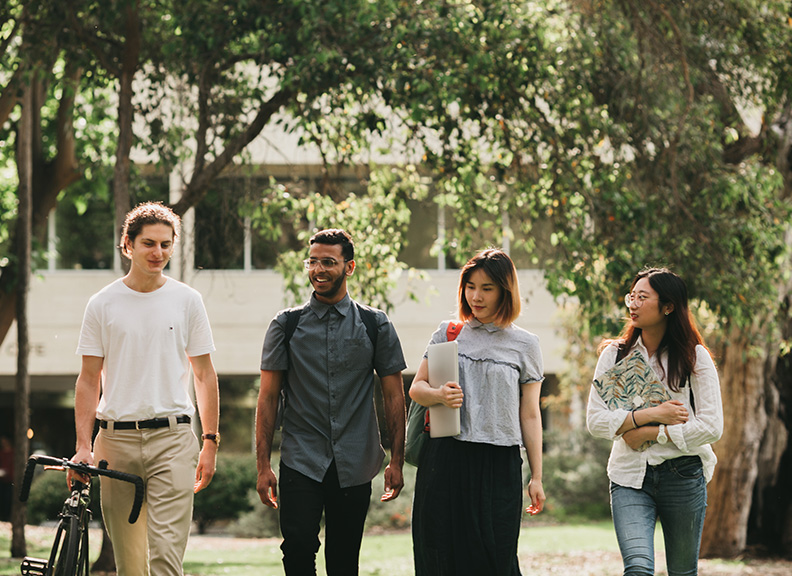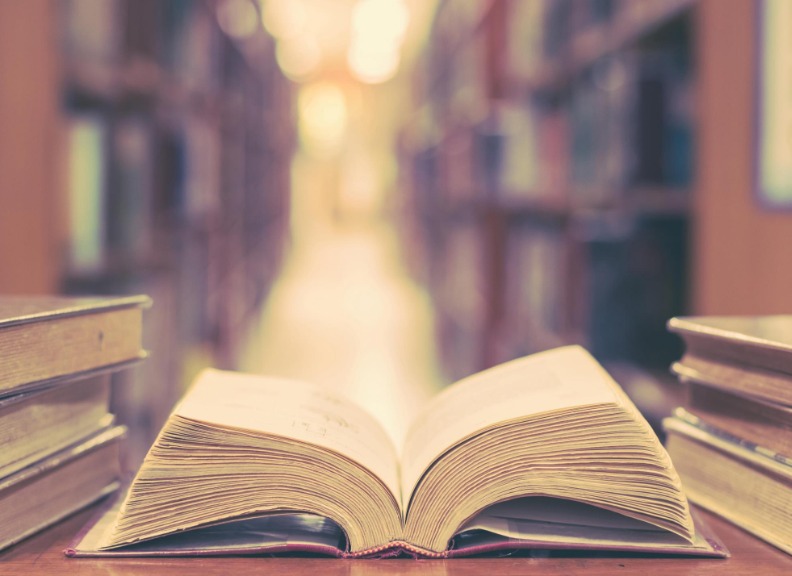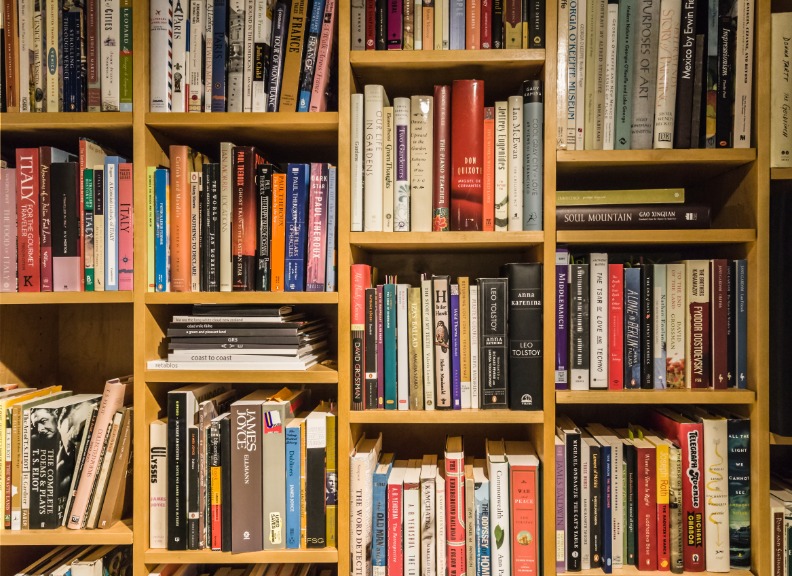Linguistics
Understanding human language
At the core of what it means to be human, and central to so much of our interaction, is language. It’s what sets us apart from every other species on earth. Linguistics at UWA aims to grow your language understanding and skills, as well as complement other areas of study where language plays a role. Gain a foundation for a career that involves language or languages, human social organisation and culture, or the human mind. Graduates could pursue a career in research, language teaching, speech therapy, journalism and broadcasting, translation and interpreting, Indigenous education and support work, or information technology.
UWA Linguistics is committed to sustainable academic practice. Read our working paper here.
The Discipline Chair of Linguistics is Associate Professor Celeste Rodriguez Louro. Associate Professor Rodriguez Louro is also Director of UWA’s Language Lab, a hub for the study of human language and its connection to history, community, and culture.
Linguistics is the most scientific of the humanities and the most humanistic of the sciences.
Nicholas Evans
Our research expertise
- Sociolinguistics/language variation and change
- Exploring how language relates to culture and society, and relations between linguistic and social variables in language and change.
- Language description and documentation
- Discovering the structures of previously undescribed languages, and documenting endangered languages.
- Anthropological linguistics
- Studying the relationship between language and culture, and how humans use language in social interactions.
- Historical linguistics
- Answering how we reconstruct the linguistic past through our study and understanding of how languages can change over time.
- Bilingualism and bidialectalism
- Investigating how bilingual individuals process and use their languages, and bilingualism and bidialectalism at the community level.
- Meaning in language: semantics and pragmatics
- Looking at how we communicate meaning through language and how meanings change through time.
Awards
A/Prof. Celeste Rodriguez Louro awarded International Society for the Linguistics of English (ISLE) Outreach Prize, 2025
A/Prof. Celeste Rodriguez Louro awarded School of Social Sciences Mid-Career Researcher Award, UWA, 2024
A/Prof. Celeste Rodriguez Louro awarded Talkley Award, Australian Linguistic Society, 2023
A/Prof. Celeste Rodriguez Louro awarded Research Fellowship at All Souls College, University of Oxford, 2026
Dr Luisa Miceli awarded two UWA Student Guild Students' Choice Awards
The Discipline of Linguistics awarded a UWA Teaching Excellence Award
Ms Katharina Froedrich awarded Forrest Research Foundation Scholarship, Forrest Research Foundation, 2024-2028
Projects
- Aboriginal English in the Global City: Minorities and language change
-
The Aboriginal English in the Global City: Minorities and language change project, funded through an Australian Research Council DECRA Fellowship to A/Prof. Rodríguez Louro, examines how Aboriginal English is used and how it is changing.
Learn more about this project in a Research Impact Story, 'Aboriginal English: It's all in the yarning'. - Aboriginal English Voices
-
Automation and voice interactions can make life easier, but First Nations people struggle because the existing technology does not accurately recognise and understand their speech. This project is the first to support First Nations people in Australia by allowing them to use Aboriginal English, the variety of English spoken by 80% of First Nations people in Australia, when interacting with technology. It squarely addresses lack of inclusion in Google's Automated Speech Recognition products such as voice search, video search, message dictation, automated captioning, and speech APIs. To achieve this, the partnership will build rich datasets of Aboriginal English using culturally appropriate processes and protocols.
To achieve these outcomes, Google has partnered with A/Prof. Celeste Rodríguez Louro, Director of UWA's Language Lab. The Language Lab will be responsible for culturally appropriate data management and collection, and for setting up culturally appropriate data governance. A Steering Committee made up of a majority of First Nations people has been established to oversee the project.
This sponsored research project will demonstrate leadership in showing how academic and tech company partners can work ethically with First Nations communities and their data. We will share best practices and deliver more inclusive technologies.
This partnership builds on A/Prof. Rodríguez Louro's and Dr Glenys Collard's longstanding collaboration. In addition to strengthening UWA as an internationally recognised hub for the study of Aboriginal English, First Nations languages and cultures, and decolonial linguistic practice, this project will create rich opportunities to train and build capacity for promising First Nations youth across Australia. These youth will be hired as research assistants, fieldworkers, and where appropriate recruited as Honours / HDR students. The project will also provide employment opportunities for First Nations consultants, scholars, and communities. - Decolonisation, diversity, and inclusion in academic research
-
A decolonial approach to academic research is key to ensuring that work with people of minoritised backgrounds is actively reparative or, at the very least, inflicts the least possible harm. Working with minoritised communities raises important questions about inequality and privilege because settler colonialism is a structure, rather than an isolated event, and because the structure of settler colonialism is steeped in histories of dispossession and cultural erasure.
This project explores the use of participatory research models, including cross-cultural co-design, which, we argue, offer the best possible candidate to begin to decolonise academic research. These questions have recently received attention in Dr Glenys Collard’s and A/Prof. Rodríguez Louro’s publication titled ‘Working together: Sociolinguistic research in urban Aboriginal Australia’ which was published in Journal of Sociolinguistics in 2021 and in the Language on the Move blog piece ‘Decolonising sociolinguistic research’. - Decolonising the Introductory Linguistics Curriculum
-
Too often, introductory linguistics courses unintentionally present languages as unitary and unchanging. Students are, for example, only asked to analyse data from a single ‘standard’ variety; data from minoritised varieties, non-native speakers, deaf language users, and neurodiverse populations is either not presented or is reserved for ‘variation’ or ‘pathology’ sections. Additionally, the voices of diverse language users themselves rarely feature directly in introductory courses.
This unintended bias toward the speech of ‘ideal native speaker-hearers’ results in students receiving an inaccurate picture of language in use. To combat this, we are restructuring the introductory linguistics units offered at The University of Western Australia, changing their content and approach so they more accurately reflect the complex linguistic reality of our world.
This project is funded by a 2023-2024 Modern Language Association Humanities Innovation Grant to A/Prof. Celeste Rodríguez Louro and Dr Amanda Hamilton-Hollaway. - Domestic uses of fire in past and present Australia: What language can tell us
-
Bringing together linguists, First Nations language experts, and archaeologists, this project innovates a style of collaboration where language knowledge and lexicography play a pivotal role in understanding Australian cultures past and present. The project explores an under-researched aspect of Australian Indigenous life: domestic uses of fire. Despite their cultural centrality, everyday practices and techniques around fire in ‘camps’ (i.e., hearths) have not been systematically documented, perhaps because they typically pertain to traditionally ‘female’ knowledge. Building upon a pilot study that involved 10 Australian languages, this project investigates an additional 30 languages from across the continent, extracting frequent lexical categories for functions and techniques related to fire, including potential regional contrasts and historical developments.
This project is funded through a 2022 Australian Linguistic Society Research Grant, and carried out by Dr Luisa Miceli in collaboration with Dr Maïa Ponsonnet (Laboratoire Dynamique du Language, CNRS), Dr Ingrid Ward (Archaeology, UWA) and Dr Emilie Dotte (Archaeology, UWA).
- Heart Foundation
-
Glenys Collard and A/Prof Celeste Rodriguez Louro are working with the Heart Foundation in the production of medical videos fully scripted in Aboriginal English. To learn more about this project, read their article 'Yarns from the heart: the role of Aboriginal English in Indigenous health communication'.
Watch the videos here:
This work has recently been nominated for a Health Consumer Excellence Award – for excellence in the provision of health services to Aboriginal and Torres Strait Islander health consumers.
- Monitoring as a driver of differential language change
-
When languages share speakers, one observed outcome is that their vocabulary differentiates while their structure converges. A monitoring process in bilingual speakers has been proposed as the mechanism responsible for vocabularies becoming more distinct over time. Words shared across a bilinguals’ languages are selected less often than language distinctive words because they are ambiguous in their language membership and may be avoided in favour of an unambiguous synonym. Could monitoring also explain convergence in structure? In this study we test the hypothesis that different change outcomes for form/structure result from differences in a bilingual’s ability to monitor for these two levels.
This project is funded by an ARC Centre of Excellence for the Dynamics of Language Transdisciplinary and Innovation Grant, and carried out by Dr Luisa Miceli in collaboration with Professor Paola Escudero (Western Sydney University), Dr Bethwyn Evans (Australian National University), and Dr T. Mark Ellison (Universität zu Köln).
- Oxford English Dictionary
-
Dr Glenys Collard, Dr Luisa Miceli and Language Lab Director A/Prof. Celeste Rodríguez Louro are consultants to the Oxford English Dictionary. They are working on updating entries for Aboriginal English and for original Australian languages. The Aboriginal English entries have been updated to reflect ways in which Aboriginal English can be weaponised (i.e. used against) Aboriginal English speakers, especially in non-Indigenous contexts, such as schools and legal settings.
Listen to a lecture by Dr Glenys Collard and A/Prof. Rodríguez Louro, delivered as part of the Oxford World English Symposium 2022. - Sustainability in Academia
-
he climate crisis is forcing us to reconsider how we live and work. The Language Lab believes in ethical, sustainable, and collaborative practice for the benefit of our planet, and ourselves. Lab Director A/Prof. Rodríguez Louro and Dr Luisa Miceli together with former colleagues created a Working Proposal which outlines how we might engage in sustainable academic work.
A/Prof. Rodríguez Louro moderated an online panel in 2020 and recently delivered a keynote presentation titled ‘Sustainable Linguistics: Inclusion, collaboration and making our field a safer place’.
She also recently wrote an invited contribution to the Helsinki sustainability blog.
- Variation and change in Australian Aboriginal English – contracted to Cambridge University Press
-
Dr Glenys Collard and A/Prof. Celeste Rodríguez Louro are currently writing a book for the Language Variation and Change Series edited by Professor Sali Tagliamonte,Cambridge University Press. The book is titled ‘Variation and change in Australian Aboriginal English’. Keep an eye out for updates.
In the meantime, read an article written by Dr Glenys Collard and A/Prof. Celeste Rodríguez Louro about Aboriginal English.
- Work Integrated Learning
-
The Language Lab is pleased to host Ms Charlotte Yeung who is currently completing a Work Integrated Learning unit in Linguistics in collaboration with RTRFM 92.1 radio. Charlotte is working with the Lab Director on producing Language Lab, a weekly segment on The Agenda, RTRFM 92.1.
Past interns include Ms Lydia Tan (2022), Billie Pitman (2023), and Grace Shepherd (2023).
Work Integrated Learning
The Linguistics major has formal internship agreements with a number of Community Language Centres in Western Australia (e.g. Wangka Maya Language Centre in Port Hedland, Bundiyarra Irra Wangga Language Centre in Geraldton). These internships can be undertaken by enrolling in LING3001.
For any inquiries, please contact Dr Luisa Miceli at [email protected].
Australian Computational and Linguistics Olympiad
The Australian Computational and Linguistics Olympiad is a state and national linguistics competition for secondary students. This competition introduces students to language puzzles which challenge natural logic and reasoning, while helping students learn about the richness, diversity and systematic nature of language.
Contact the School of Social Sciences
Access
Weekdays 8.00am—4.00pm





